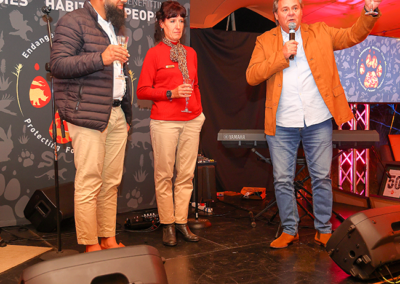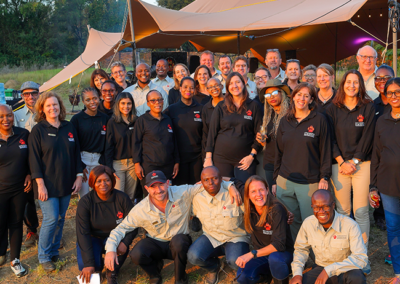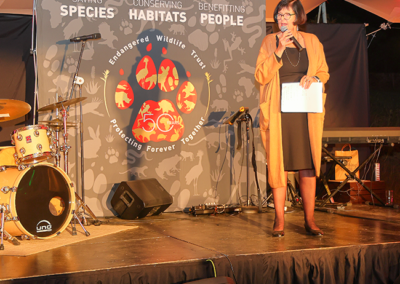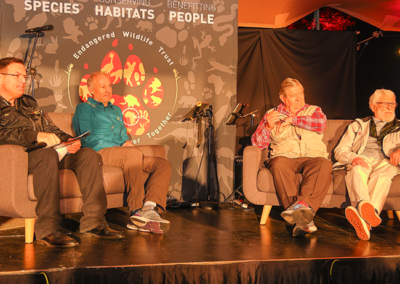The Endangered Wildlife Trusts Commits to the future as it ends its 50th anniversary celebration under African skies
The earth-friendly event, with solar power and repurposed, natural and recyclable décor was held as a bush banquet under African stars at our Conservation Campus in Midrand, Gauteng. On arrival, guests were able to take a walk through the one-of-a-kind gardens that depict the ecosystems that the EWT works in.
We were honoured to share the evening with two of our founders, Clive Walker and James Clarke, former CEO’s, John Ledger and Nick King, present and past Trustees of the EWT Board, present EWT Board Chair Muhammed Seedat and the EWT’s CEO Yolan Friedmann.
During the evening of celebration, Yolan stated that the EWT’s 50th anniversary may not be a celebration of a “coming of age, but is one of a youthful spirit, blended with wisdom, a touch of maturity, a dash of streetsmarts, a helping of hope and a lot of energy still to be spent to realise dreams that are still big enough to scare us, in the words of Ellen Johnson Sirleaf.”
As the country’s longest-serving female CEO of a conservation organisation, Yolan said the EWT prides itself on instilling hope and not a sense of fear, loss or hopelessness when talking about our natural world.
“Instead, we prefer to show, with evidence, the difference we can all make when we work together,” said Yolan. “For 50 years, we have pushing back the tide and finding solutions; this is the thread that binds us and which continues to blur the generational lines, to form one united EWT”.
Forestry, Fisheries and the Environment Minister Barbara Creecy said during her keynote address that non-governmental and non-profit organisations, such as the EWT, play an important role in securing the future of not only our country’s rich biodiversity and conservation, but also in ensuring that communities living with wildlife outside conservation areas are able to share in the benefits of the environment.
In reference to the country’s commitment to achieving the Global Biodiversity Framework’s goal of conserving 30% of land and 30% of the sea by 2030, Creecy pointed out that South Africa may only achieve this target between 2036 to 2040, adding it may take longer in the marine environment which was less well researched and documented.
Achieving this objective created new challenges for all involved in the biodiversity and conservation fields, particularly important organisations such as the EWT which, in celebrating its 50 years of work, would be posing the question of what the fundamental issues will be in conservation in the next half a century, she said.
Addressing the issue of land restoration, transformation of the biodiversity sector, unemployment and community beneficiation – all areas which impact on the conservation estate — would require support from NGOs “because sometimes government is too big and too far away to undertake those processes properly”.
-

Deputy Board of Trustees Chair Dirk Ackerman raises a toast to the EWT’s 50th anniversary.
-

EWTEWT staff ready for the gala event at the Conservation Campus. staff ready for the gala event at the Conservation Campus.
-

Minister of Forestry, Fisheries and the Environment Barbara Creecy, in thanking the EWT for its contributionto government’s environmental agenda, said she had no doubt that we could continue to contribute to “government’s policy and to our common struggles”.
Guests were honoured with an inciteful Founders Forum facilitated by MC and radio personality Rob Vega, during which Clive Walker, John Ledger, James Clarke and Nick King shared their experiences and insights, providing all with a glimpse into the founding and growth of the EWT.
When the EWT was founded in 1973, biodiversity and conservation were not household issues, said John, who added during the discussion that biodiversity, wildlife and all components of ecosystems are outside protected areas.
Clive said it was after a hike with John that he came to realise that all people play a role in conservation.
His entry to conservation and the ultimate establishment of the EWT came about through Ian Player’s Wilderness Leadership School. “I went on a five-day walk….and realised that I would like to do something like this”.
Speaking to all who support the work of the EWT, Clive said: “All of us play a role in conservation…. Never ever underestimate the work that you do”.
Nick reminded all the conservation is not just about animals. Environment is not a fad issue; it is fundamental, and it is life, he said.
Reminiscing about his tenure as CEO of the EWT, Nick told of how the organisation has grown from a staff complement of about 40 in 2003 to more than 120 today under Yolan’s guidance.
The EWT, he said, has turned around from an organisation conserving species in the seventies to focusing on a better and healthier environment for people and everything else, which the EWT has shown is possible.
James said after witnessing the changes that have taken place in the past 50 years, “when I came here, I was overwhelmed by what I saw”.
The Minister said in a country where there are enormous demands on the fiscus and where the economy is not growing, there is a need to find a way in which conservation can be self-sustaining and self-financing, and where “developed countries, which created the climate crisis which is threatening all our well-being, must come to the party and must support developing countries, who own most of the conservation estate in the world, in our conservation objectives better”.
Referring to the issue of climate depression, she said it was when one comes to event such as the EWT’s 50th anniversary celebration and where “one sits with many, many people who have dedicated their entire lives to promoting conservation and biodiversity objectives in our country; who have made sure that endangered species have not gone extinct – in fact, on the contrary have thrived and multiplied – one realises that what this journey requires is willpower, human willpower, to make sure that the very precious, God-given environment that we have, is not destroyed and can benefit current and future generations”.
“Let me take this opportunity to say thank you for the relationship that we have enjoyed and thank you for the contribution that the EWT is making, and I have no doubt will continue to make to government’s policy and to our common struggles. I hope we will continue to work for the better of our country and for biodiversity and conservation,” she said.
Casting an eye to the future, Yolan said in 50 years the world will not be an easier place for much of the planet’s human and wildlife populations.
Because of this, the EWT needs to write a new chapter, and this book will come with new challenges and opportunities. “We owe it to the next generations of brilliant EWTers to continue in the footsteps of our giant founders and to stay connected to the dreams of what we know can be achieved tomorrow, as we sit here tonight”.
Through the launch of our Fund for the Future in our 50th year we aim to secure the EWT, our people and our impact, for the wildlife and the communities that they will serve, for decades to still come and for generations not yet born.
“This strategy will ensure that we channel our efforts into achieving targets that stretch us and will achieve high impact; that will galvanise cohesive, collective action towards achieving global, and national conservation priorities and which will benefit a maximum range of species, and humans, realistically,” she said.
** The EWT would like to thank Painted Wolf Wines for their kind support in hosting our 50th anniversary gala event.
-

-

-

EWTEWT staff ready for the gala event at the Conservation Campus. staff ready for the gala event at the Conservation Campus.
